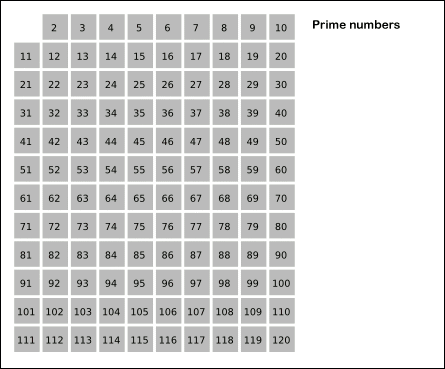Problem
Given n, find all prime numbers less than n.
Approaches
We can simply iterate over numbers and test if they are prime. A simple primality test would run in
O(sqrt(n))and the fastest primality test algorithms run slower thanO(log(n))1. This approach at best would result in an overallO(nlog(n))runtime complexity.We can use the famous Sieve of Eratosthenes and using
O(n)memory, we can find all prime numbers inO(nlog(log(n))). (the image is taken from Wikipedia)
prime = [True] * (n + 1)
prime[0] = False
prime[1] = False
for i in range(2, n + 1):
if prime[i]:
for j in range(i * i, n + 1, i):
prime[j] = False
1 For example, AKS Primality Test or Miller-Rabin Primality Test both run in O(logO(1)(N)).
Why is “Sieve of Eratosthenes” slow?
The main issue with Sieve of Eratosthenes is that it marks each composite number from all of its prime factors. For example, number 60 is marked from 2, 3 and 5 (60 = 2*2*3*5), while it would have been enough to just mark it from one of the prime factors, say 2.
If we find a way to mark each composite number only from one of its prime factors, we will have a linear time solution.
Linear-time solution
In order to find all prime numbers up to n, we keep track of two arrays:
primes: list of all prime numbers we have found so far.lp[x]: the smallest prime factor for integerx.
Now, imagine a composite number such as 3 * 5 * 7. We need to mark such a number from its lowest prime factor 3 by setting lp[3 * 5 * 7] = 3. However, instead of marking it from 3, we mark it from 5 * 7.
In order to do so, when we are at i = 5 * 7, for each prime p <= 5, we mark p * i. Basically, we do:
lp[2 * 5*7] = 2lp[3 * 5*7] = 3lp[5 * 5*7] = 5
More formally, for each i, we look at lp[i] and for all primes p less than or equal to lp[i], we set lp[p * i] = p.
So, we start with lp initialized with 0. We iterate over all numbers from 2 to n. If lp[i] == 0, it means i is prime, so we set lp[i] = i. Otherwise, i is a composite number and we have already stored its smallest prime factor in lp[i].
Now, using all prime numbers less than or equal to lp[i] we set some future composite numbers. (note that we do this where i is prime or composite)
Implementation
The code would look something like this:lp = [0] * (n + 1);
primes = []
for i in range(2, n + 1):
if lp[i] == 0:
lp[i] = i
primes.append(i)
for j in range(len(primes)):
if primes[j] > lp[i] or primes[j] * i > n:
break
lp[primes[j] * i] = primes[j]
Correctness
Suppose we arrive at a composite number C and p is the smallest prime factor in C. C is uniquely represented as: C = p * X for some number X > 1. Since p is the smallest prime factor in C, p is also smaller or equal to the smallest prime factor in X. This means we should have marked C when we arrived at X **1.
1 Remember that for each number X we mark all composites p * X for primes p smaller than or equal to the smallest prime factor in X.
Complexity
Every composite number x is uniquely represented as x = lp[x] * y. So, it will be visited from only one number y. And prime numbers will not be visited from any other number. So, in total we have |composites| visits + n for iterating over all numbers. In total: O(n).
Base Case: For i = 2, lp[i] is zero, so we figure 2 is a prime and we set lp[2] = 2.
Invariant: For all numbers i up to k,
Correctness (OLD
We can use proof by contradiction to prove we will always mark a composite number before arriving at it.
Suppose not. Assume a composite number C is not marked when we arrive at it. we know that C = lp[C] * X for some 1 < X < C and lp[C] is always prime. We also know that lp[C] is the smallest prime factor in C, so we know as well: lp[C] <= lp[X]. But this contradicts with the assumption of our algorithm since when we visited X, we should have marked lp[C] * X since lp[C] is a prime number less than or equal to the smallest prime factor of X.
Prime factorization
This linear-time algorithm not only gives us all the prime numbers up to n but also gives us the prime factorization for all numbers up to n! Using lp, we can recursively extract the lowest prime until no more primes left.def prime_factors(x):
res = []
while lp[x] > 0:
res.append(lp[x])
x /= lp[x]
return res
Source
I read about this on cp-algorithms.